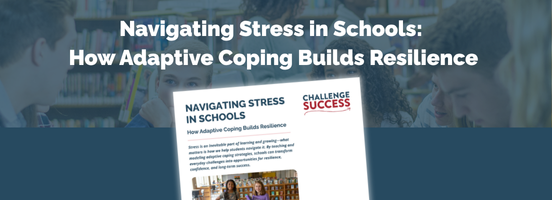Below are communication tips for spreading the word about your Challenge Success related events and initiatives like Parent Education workshops, Career Days, or Wellness activities with families, staff, and the wider school community.
1. Post in your school’s newsletter and website.
Make sure families in your school know about upcoming events by marketing them in your school newsletter and on your website. For event posts, be sure to include:
- Logistics (date, time, location, registration links)
- Target audience (parents only, students welcome, K-12, 9-12, etc.)
- Information about the speaker(s) and/or topics
- Social media links
- For multilingual communities, make the information available in multiple languages.
Additionally, your school may choose to establish a separate Challenge Success newsletter or Challenge Success website to share your ongoing work.
Examples from Partner Schools:
- Dover-Sherborn created a Challenge Success newsletter to share events and progress with their extended school community.
- Northwood High School created a Challenge Success page on their website to share resources and information to a broad audience.
2. Leverage event posting opportunities in your broader community.
For events that are open to people beyond your immediate school community, ask other schools, organizations, and community groups to help you spread the word by posting about your event in their newsletters and websites. Groups to consider:
- Public schools in your district and/or neighboring private schools
- Community centers
- Local art and athletic programs
- Local health centers
- “Nextdoor” or other community networks
- Community newspaper calendars
3. Identify and rally ambassadors.
Word-of-mouth is an important tool for communicating your work.
- Identify parent and faculty leaders who are excited to help get people involved and drive attendance.
- Assign these ambassadors to share the event or learnings with specific groups (e.g. PTA, athletic teams, neighborhood groups)
- Create pre-recorded calls or texts (in multiple languages) from the principal or parent liaison to disseminate to families.
- Create multilingual flyers for ambassadors to share in the community and families in their network.
4. Share events and learnings on social media.
Here are some practical ways to use social media to promote your events:
- Create a Facebook event connected to your school’s Facebook account. If your school doesn’t use Facebook, this can be done by a parent or educator from their personal Facebook account
- Use your school tags and Challenge Success social media tags (FB: @ChallengeSuccess, Twitter: @ChalSuccess, Instagram: @ChallengeSuccess, LinkedIn: @ChallengeSuccess) when posting on Facebook, Twitter, or other platforms. See this example of Corona del Mar’s promotion of their parent book club on Instagram.
- Ask parents, educators, and students who are active on social media to share event information on their accounts.
- Ask participants to share photos, quotes, or learnings via social media during and after the event with hashtags you designate for the event (e.g. #WestfordCS, #NorthwoodParentEd, #CSParentEd, #ChallengeSuccess)
- Assign someone from your organizing team to post on social media during and after the event using these hashtags.
Examples from Partner Schools:
- Medfield High School shared their stress tree and pictures from their Parent Education night on Twitter.
- Byram Hills School District used Facebook to promote their presentation on college admissions from Dr. Denise Pope and then share learnings from the event.
- The Alexander Dawson School shared their student-run sleep campaign on their podcast and through Instagram and Twitter.
5. Invite local print and TV media to cover your events or share your insights.
Contact the education reporter from your local newspaper via email or Twitter to tell them about your event. The pitch can be a short blurb about your event or current learning. Here are some tips to consider when reaching out to local media:
- Connect with local journalists who have shown interest in your topic (though past articles and reporting)
- Establish a clear explanation of why the event or story matters to your community.
- Offer a clear story arc with an introduction of the situation, conflict and then the resolution.
- Share data on the topic that you’re pitching. This could come from your school survey or use relevant research data from Challenge Success.
- Pre-identify someone – a parent, educator, or student – who can be the face of the story if a reporter is interested in doing an interview.
Alternatively, you can submit an article or editorial to your local paper about your work. Student voices are particularly appealing and powerful for editorials.
Examples from Partner Schools:
- Folsom High School students were honest and vulnerable in this heartfelt interview with their local ABC TV station talking about stress and their work with Challenge Success.
- Several schools have been successful getting local media coverage about their school change efforts like this article about the Rye City School District and this interview with the Wellesley High School principal.
- A parent from Westford Public Schools did an interview with a local TV network to share their motivations behind working with Challenge Success.
Additional Resources
Creative marketing turns school events into networking, branding opportunities | Education Dive
8 Ways Schools Can Form a Better Relationship With the Media | EdSurge
